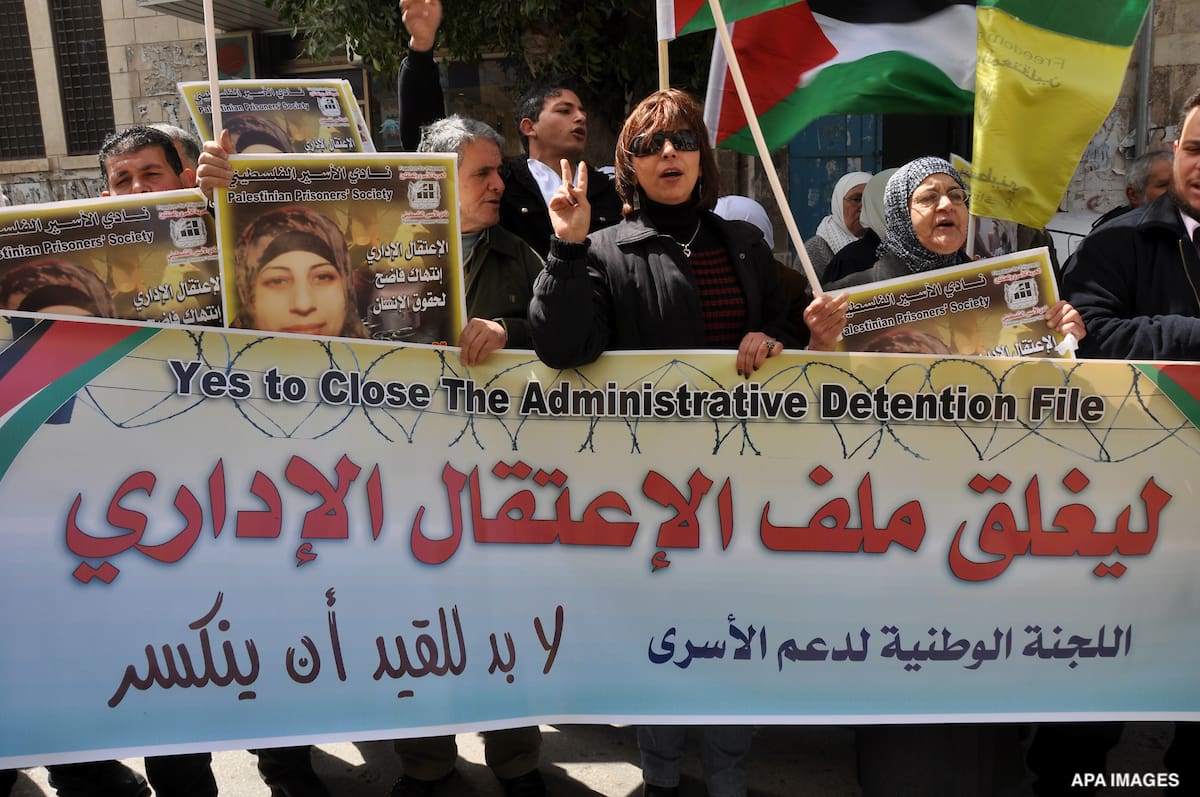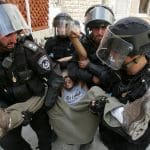
Executive Summary
The Israeli regime makes widespread use of administrative detention, where Palestinians — framed as a danger to “security” and “public order” — across colonized Palestine are detained for indefinite periods without charge or trial. This policy brief provides historical and legal context for Israel’s use of administrative detention against Palestinians, and explains how the practice relates to the broader functioning of Israeli military courts and their criminalization of Palestinian activism.
The brief highlights Palestinian administrative detainees’ 2022 collective boycott of military courts and situates it within the wider repertoire of Palestinian resistance to Israeli carceral policies. While the boycott was called off in June 2022 with some gains for the detainees, it affirmed that collective action is needed to end the Israeli regime’s use of administrative detention. The brief thus offers recommendations for how Palestinian political leadership, civil society organizations, activists, and local and international solidarity groups can collectively do so.
The Israeli regime justifies administrative detention as necessary for “security” purposes. In practice, however, Israel never adheres to restrictions set by international law, which permit states’ recourse to this measure only in exceptional circumstances. Detainees are frequently prevented from accessing effective legal defense because judges may receive “secret” evidence — undisclosed due to “security” considerations — in the absence of detainees and their counsel. Moreover, contrary to the Israeli courts’ purported claim that detention orders are judicially reviewed, detainees attest that they are only released following the approval of the Israel Security Agency (the Shabak).
Fundamentally, Israel’s use of administrative detention is a form of psychological warfare: it subjects detainees and their families to a perpetual state of uncertainty, as detainees never fully know when they will be released. But more broadly, Israel’s widespread resort to administrative detention affects all Palestinians under Israeli control. Palestinians from the river to the sea live in a reality in which they do not know when, why, or for how long they might be arbitrarily imprisoned. This was made apparent by the Israeli regime’s extensive use of administrative detention during and following the 2021 Unity Intifada.
For as long as Israel has employed administrative detention, however, Palestinian detainees have resisted with protests inside prisons, individual or collective hunger strikes, and boycotts of military courts. The efficacy of hunger strikes in particular is constantly debated among Palestinians, but it is worth noting that they have gained international attention and illustrate the centrality of administrative detention for the Israeli regime. Even if these tactics have only succeeded in securing the release of individual detainees, their consistent use and historical duration has meant that administrative detainees fulfill a critical and strategically symbolic role in the broader Palestinian liberation struggle.
On January 1, 2022, the nearly 500 administrative detainees held in Israeli prisons at the time launched a collective boycott of military courts and called on lawyers not to attend court sessions nor to engage in judicial processes related to their detention. Moreover, in their public statement, the detainees threatened to undertake a collective hunger strike if the boycott did not succeed in forcing Israel to end the policy. By framing these escalating moves as part of a “mass united resistance movement,” the detainees affirmed their conviction in the power of collective action.
The 2022 boycott demonstrated the importance of collective action in ending the Israeli regime’s policy of administrative detention. To support Palestinian prisoners in their intifada and to ensure that this long-standing policy comes to an end:
- The Palestinian Authority (PA) and its associated Commission of Detainees and Ex-Detainees Affairs should highlight the detrimental effects of administrative detention on Palestinians to the international community, and advocate for an end to this policy in all international forums, including by demanding Israel be held accountable for its violations of the international human rights laws it ratified.
- Palestinian civil society organizations, including those working on issues related to prisoners, should continue to rally support for Palestinian administrative detainees both locally and internationally.
- Across colonized Palestine, Palestinians and their allies should more actively organize public events and protests in support of Palestinian prisoners, including administrative detainees.
- The families of administrative detainees should establish a working committee which could centralize solidarity efforts on behalf of detainees. This step, mirroring other committees organized in Palestine and internationally (Argentina’s Mothers of the Plaza de Mayo, for instance), would further shed light on the policy’s broader impact on Palestinian society.
- International Palestine solidarity groups should include the Israeli regime’s carceral system in their boycott and divestment campaigns. These campaigns should target any companies benefitting from the Israeli carceral system. They should also amplify calls to end the Deadly Exchange program between Israeli and US law enforcement agencies — tactics that manifest in prisons and detention centers across colonized Palestine.
Overview
The Israeli settler-colonial regime has long employed the policy of administrative detention as part of its carceral tactics against Palestinians. This policy allows Israel to detain Palestinians at any given time and indefinitely, without charge or trial. Its widespread and arbitrary application allows the Israeli regime to criminalize Palestinian social and political mobilization, and to thwart Palestinian resistance against ongoing violence and dispossession — all by framing these Palestinians as a danger to Israel’s “security” and “public order.”
Israel’s use of administrative detention dates back to the early days of its violent inception, and detainees have consistently demanded an end to its use, highlighting the harm it inflicts on them and their families. On January 1, 2022, the nearly 500 administrative detainees held in Israeli prisons at the time launched a collective boycott of military courts and called on lawyers not to attend court sessions nor to engage in judicial processes related to their detention. This boycott, which ended on June 27, 2022,1 is a continuation of decades of Palestinian struggle against Israel’s carceral policies — including through hunger strikes, demonstrations against prison authorities, and certain forms of cultural production from captivity.
This policy brief contextualizes Israel’s use of administrative detention against Palestinians, historically and legally, and explains how the policy relates to the broader functioning of Israeli military courts and their criminalization of Palestinian activism. It also examines the detainees’ most recent boycott of military courts, situating this action within the wider repertoire of detainees’ responses to Israel’s systemic violation of their rights. While the months-long boycott did not result in the termination of the practice of administrative detention, it affirmed that unified action by detainees, activists, lawyers, Palestinian political leadership, and allied local and international civil society and human rights organizations is needed to actualize this goal.
Israeli Administrative Detention in Historical and Legal Context
Across the world, governments may administratively detain individuals they deem pose a “security risk” and justify such action as preemptively thwarting potential threats. International humanitarian law and international human rights law permit states’ recourse to this measure under strictly defined codes and exceptional circumstances. That is, administrative detention is regarded as an extreme measure that should be subject to strict legal provisions and oversight mechanisms.
The juridical review processes create a facade of judicial oversight while allowing Israel to bypass legal battles through which the detainees and their lawyers would be able to bring forth an actual defense Share on X
For instance, Articles 42 and 78 of the Fourth Geneva Convention (1949) — ratified by Israel in 1951 — permit the use of administrative measures, including administrative detention, solely if deemed absolutely necessary to maintain the security of the detaining power. The International Covenant on Civil and Political Rights (ICCPR) — ratified by Israel in 1991 — similarly permits administrative detentions only in exceptional circumstances.
An Intricate Legal Regime
The use of administrative detention in Palestine dates back to the British Mandate, when the colonial government adopted the 1945 Defense (Emergency) Regulations, effectively imposing martial law in Palestine. The regulations also allowed the colonial government to establish military courts as it deemed necessary. The Israeli settler-colonial regime adopted these regulations upon its creation in 1948, and over the years, formulated various laws to allow for the prolonged detention of Palestinians under the pretexts of maintaining “security” and “public order.”
Currently, the Israeli regime uses three distinct laws and orders to justify and facilitate administrative detention across colonized Palestine:
1. Military Order 1651, Order Regarding Security Directives [Consolidated Version],2 authorizes the commander of the Israel occupation forces, or commanders authorized by him, to issue administrative detention orders against Palestinians from the West Bank for periods not exceeding six months and to renew them indefinitely. Furthermore, it permits the judge of the military court to receive evidence in the absence of detainees and their legal counsel, and not to disclose it if the judge is convinced that doing so “may harm regional security or public security,” thus preventing any form of legal defense.
2. The Internment of Unlawful Combatants Law allows Israel to detain Palestinians in Gaza for an indefinite period. It defines an “unlawful combatant” as a person who is not entitled to the status of prisoner of war, and who is engaged in “hostilities” against Israel, or is a member of a force that is engaged in “hostilities” against Israel. Unlike military laws applicable to residents of the West Bank that specify the duration of each detention order, the detention of “unlawful combatants” is not restricted in time. Detentions only end if the Israeli defense minister believes that the conditions justifying them cease to exist.
Under this law, detainees must be brought before an Israeli district court no later than 14 days following their detention, and if an order is issued, they must be brought for a judicial review every six months. Judges are not required to present evidence, and the deliberations are carried under the pretext of “secret” evidence that cannot be disclosed due to “security” considerations.
3. The Emergency Power (Detentions) Law of 1979 is used inside 1948 territories and Jerusalem to detain Palestinian Jerusalemites and Palestinian citizens of Israel. It permits the Israeli Defense Minister to issue detention orders for renewable periods of up to six months, and has been used increasingly since the 2021 Unity Intifada, which saw widespread mobilization among Palestinians.
These three laws and orders are part of the Israeli regime’s ongoing lawfare against Palestinians across colonized Palestine. They extend the work of Israeli military courts, where Palestinians are treated as threats to be managed, and through which their lives are subject to constant monitoring, surveillance, and punishment. But unlike military court procedures, by elevating the oft-cited notions of protecting “security” and maintaining “public order,” these policies allow Israel to incarcerate Palestinians without the need to provide evidence or bring detainees to trial. The laws work to effectively punish Palestinians for their civic and political work, thus hindering their resistance by attempting to instill fear and submission in them.
The arbitrary nature of administrative detention is exemplified by the lack of effective judicial oversight mechanisms. In effect, and as administrative detainees commonly attest, detainees are only released following the approval of the Shabak, the Israel Security Agency. Contrary to the claim purported by Israel’s courts that detention orders are judicially reviewed, administrative detainees and their lawyers constantly point to the dominant role that the Shabak plays in determining detention periods. In this way, the juridical review processes create a facade of judicial oversight while allowing Israel to bypass legal battles through which the detainees and their lawyers would be able to bring forth an actual defense — notwithstanding that Israeli military courts always presume a “guilty” Palestinian to be tried and sentenced.
This is further exemplified by the multiple cases of Palestinians who are transferred to administrative detention centers when the Israeli authorities are unable to charge them in military courts. For instance, eighty-year-old Bashir Khairi was arrested in October 2021 and originally presented with a list of charges in Ofer military court. Over a month later, and due to the military court’s inability to charge him, the Israeli military prosecutor issued a six-month administrative detention order against Khairi that was renewed an additional time since.3
Administrative Detention in Practice
The Israeli regime justifies administrative detention as necessary for “security” purposes. In practice, however, Israel’s use of the policy never adheres to restrictions set by international humanitarian law and human rights law. Rather, it is intended to thwart Palestinian civic and political activism, to suppress resistance, and to attempt to instill fear among the colonized population. That is, administrative detention is never used as a “preventative” measure in “exceptional” circumstances: it is a core policy that inflicts long-lasting damage on Palestinian detainees, their families, and Palestinian civic and political institutions at large.
Indeed, Israel’s use of administrative detention is a form of psychological warfare. First and foremost, it subjects detainees and their families to a perpetual state of uncertainty. As administrative detention orders can be renewed indefinitely, detainees never fully know when they will be released. In many cases, detentions are renewed just hours prior to the expiry of the orders. This reality was described by one detainee as akin to the Greek myth of Sisyphus, in which the cursed protagonist struggles to carry a rock up a mountain, always failing in the moment he reaches the summit, and is thus forced to begin his journey once again.
Administrative detention is never used as a 'preventative' measure in 'exceptional' circumstances: it is a core policy that inflicts long-lasting damage Share on X
The number of Palestinians in administrative detention has varied over the years. During the First Intifada, it is estimated that a total of 14,000 Palestinians were held in Israeli administrative detention, while during the Second Intifada, numbers ranged between 700 and 1,000 administrative detainees each month. And during the 2021 Unity Intifada, the Israeli regime responded with extensive use of administrative detention across colonized Palestine. By the end of 2021 alone, the Israeli military commander in the West Bank had issued 1,595 administrative detention orders, including renewals of previously issued orders against current Palestinian detainees. Today, out of the 4,700 Palestinians imprisoned by Israel, 640 are held under administrative detention, including children, activists, civil society workers, and members of the Palestinian Legislative Council (PLC).
The lived reality of Palestinian detainees constitutes part of the violence that the Israeli regime has long inflicted on them and their families through carceral practices. More broadly, Israel’s widespread and arbitrary use of administrative detention affects all Palestinians across colonized Palestine. Palestinians from the river to the sea live in a reality in which they do not know when, why, or for how long they might be imprisoned.
Challenging Israeli Administrative Detention
For as long as Israel has used administrative detention, Palestinian detainees have employed a variety of tactics to challenge this policy. Over the decades of Israeli occupation, detainees have led protests inside prisons, individual or collective hunger strikes, and boycotts of military courts and their judicial processes — resistance tactics that are often met with violent and punitive measures.
Amnesty International documented that Palestinian administrative detainees went on hunger strike in al-Naqab Prison as early as February 1989. Detainees’ resistance continued in the 1990s: following the signing of the Oslo Accords, which ushered in a new era of widespread and indefinite administrative detention, detainees announced the first boycott of military courts on August 4, 1996. This boycott lasted for six months without achieving any concrete changes. During this period, Palestinian detainees also burnt their wooden beds and prison tents to further protest their detention.
Israel’s use of administrative detention increased during the Second Intifada. While only 32 Palestinians detainees were held in November 2001, by May 2002, that number skyrocketed to more than 700. Throughout the Second Intifada, Palestinian detainees resorted to multiple measures of protest, including burning their beds and tents, rejecting the prison authorities’ orders, refusing to accept and sign detention renewal orders, and protesting in the prisons’ courtyards. The detainees also engaged in several military court boycotts, though they were not widespread and rarely lasted more than three months.
In December 2011, Palestinian administrative detainee Khader Adnan began his first hunger strike, demanding the termination of his administrative detention and his immediate release. The strike lasted for 66 days, after which an agreement was reached to end his detention and to release him on April 17, 2012. Adnan resorted to hunger strikes during his subsequent detentions in 2015 and 2018. Inspired by Adnan’s first hunger strike, dozens of administrative detainees followed suit with individual strikes of their own. On April 24, 2014, administrative detainees began a collective hunger strike that lasted for two months. The strike was called off on June 25, 2014, with no concessions made by Israel and with only an agreement to continue dialogue on issues related to administrative detention. Until today, detainees continue to resort to hunger strikes as a measure to protest Israel’s use of this policy.
Palestinians from the river to the sea live in a reality in which they do not know when, why, or for how long they might be imprisoned Share on X
The effectiveness of individual hunger strikes in the face of the broader administrative detention policy is frequently debated among Palestinians, but it is worth noting that they have gained international attention and have highlighted the severe impact of administrative detention on detainees and their families. Moreover, hunger strikes shift the political burden onto Israel. That is, the Israeli regime can agree to release administrative detainees or risk widespread protests and mobilization in the event that the health of hunger strikers deteriorates in detention.
Broadly, hunger strikes and other forms of protest by administrative detainees illustrate the policy’s centrality for the Israeli regime. Even if these tactics have only succeeded in securing the release of individual detainees, their consistent use and historical duration illustrates the critical and strategically symbolic role of administrative detainees in the broader Palestinian struggle for liberation.
“Our Decision is Freedom”
In January 2022, Palestinian administrative detainees began a collective boycott of Israel’s military courts under the slogan: “Our decision is freedom. No to administrative detention.” In a published statement, the detainees specifically outlined the arbitrary nature of administrative detention arrests and described the physical and psychological toll that this practice has taken on them. Moreover, they called for solidarity and support in their boycott of military courts, which they began after reaching a dead-end in negotiations with the Shabak and the Israeli Prison Service.
The boycott applied to all levels of Israeli military courts: detainees were to refuse to attend court procedures and hearings, and lawyers were to boycott court sessions. The detainees further threatened to undertake a collective hunger strike if the boycott did not succeed in forcing Israel to meet their demand to end the policy. By framing these escalating moves as part of a “mass united resistance movement,” the statement testified to the detainees’ conviction in the power of collective action.
The boycott came at a time during which the Israel Prison Service sought to fragment the detainees’ movement and to instate a wide range of punitive measures against all Palestinian prisoners, particularly in response to the escape of six prisoners from Gilboa prison in September 2021. The boycott also came amid the Israeli regime’s increased use of administrative detention against Palestinians from Jerusalem and 1948 territories throughout the ongoing wave of resistance across colonized Palestine, which began in May 2021.
The scope and duration of the detainees’ boycott underscored the ways in which the Israeli regime’s carceral and legal policies impact Palestinian lives, whether in detention or not. Indeed, Israel’s carceral regime extends beyond the confines of prisons and interrogation rooms to impact the lives of Palestinians across colonized Palestine who either have family members in detention or who themselves are awaiting detention on arbitrary grounds.
Palestinian administrative detainees’ 2022 boycott of Israeli military courts thus asserted that the Israeli regime’s legal structures cannot offer justice, for they are specifically designed to harm and punish Palestinians, and to rid them of their will to resist. In doing so, the boycott undermined any sense of legitimacy that Israeli military courts attempt to claim and affirmed that collective action is necessary to end the policy of administrative detention.
What Needs to be Done
Just as the administrative detainees’ boycott gained significant traction over the first half of 2022, Palestinians and their allies should mobilize to ensure that the Israeli regime’s practice of administrative detention ends. Several Palestinian and international organizations have been demanding an end to the policy and highlighting its impact on Palestinians more broadly. These include Amnesty international, Addameer: Human Rights and Prisoners’ Support Association, and the Defense for Children International – Palestine Section.
But more must be done:
- The Palestinian Authority (PA) and its associated Commission of Detainees and Ex-Detainees Affairs should highlight the detrimental effects of administrative detention on Palestinians to the international community. They must advocate for an end to this policy in all international forums, including by demanding Israel be held accountable for its violations of the international human rights laws it ratified.
- Palestinian civil society organizations, including those working on issues related to prisoners, should continue to rally support for Palestinian administrative detainees both locally and internationally. Addameer’s work is notable for its creative and continuous campaigns against administrative detention, which highlight the policy’s intricate connection to the functioning of the Israeli regime’s military courts.
- Across colonized Palestine, Palestinians and their allies should more actively organize public events and protests in support of Palestinian prisoners, including administrative detainees.
- The families of administrative detainees should establish a working committee that could centralize solidarity efforts on behalf of detainees. This step, mirroring other committees organized in Palestine and internationally — Argentina’s Mothers of the Plaza de Mayo, for example — would further shed light on the policy’s broader impact on Palestinian society.
- International Palestine solidarity groups should include the Israeli regime’s carceral system in their boycott and divestment campaigns. These campaigns should target any companies benefitting from the Israeli carceral system, including Hewlett Packard Enterprise and G4S, which is currently owned by Allied Universal. They should also amplify calls to end the Deadly Exchange program between Israeli and US law enforcement agencies — tactics that manifest in prisons and detention centers across colonized Palestine.
- On June 27, 2022, a committee representing the administrative detainees released a statement announcing a freeze on the boycott campaign. The statement indicated that administrative detainees reached an agreement with prison authorities to restrict the use of administrative detention, particularly against women and children, and to consider the release of elderly and sick detainees.
- Previously, administrative detention was authorized under two orders: Military Order 1226 and Military Order 1591.
- ashir Khairi was released from administrative detention on July 7, 2022.












